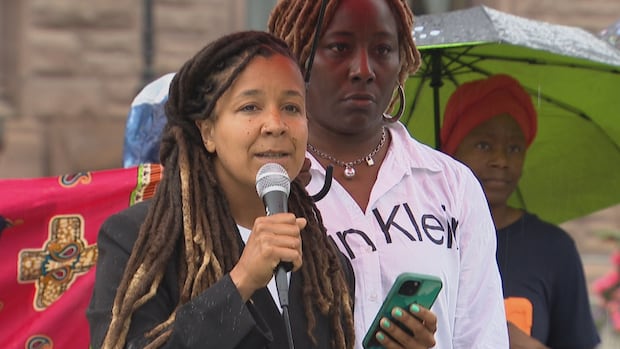[
A group of parents and teachers gathered in the rain outside the Ontario legislature on Thursday to protest a bill that could bring police officers back to public schools.
Bill 33, Supporting Children and Students Act, 2025, would require school boards to implement School Resource Officer programs (SRO) where offered by local police services, starting next school year. The legislation, which would also give the education ministry power to put school boards under supervision more easily, recently passed second reading.
The Toronto District School Board (TDSB) cancelled its SRO program in 2017 after staff found that the presence of uniformed police officers stationed in schools caused some students to feel uncomfortable and intimidated.
The TDSB declined to comment on the bill on Thursday. CBC News also reached out to Ontario’s education ministry for more details, but did not receive a response.
Police in schools makes children less safe, professor says
Bringing police officers back to schools is regressive and what schools need is better funding not police, speakers told the crowd.
“Police in school programs make our children less safe and not more safe,” Robyn Maynard, a parent of a child in a TDSB school and an assistant professor at University of Toronto, said.
Maynard said studies of school resource officer programs have found that children, particularly Black and Indigenous children, are criminalized for things that would normally be dealt with through everyday discipline.
Since the SRO program ended in Toronto schools, arrests of have gone down, particularly arrests of young Black people, Maynard said.
“Removing police from schools was a crucial advance of racial progress that helped protect our children, that helped protect Black, Indigenous and racialized students, students living with disabilities, students living with mental health issues, and LGBTQI students from harm and from being stopped, searched, targeted and criminalized for everyday instances of young people being young people,” Maynard said.
Maynard said the legislation “will criminalize children while undermining the democratic decision making of school boards. It’s dangerous to Black, Indigenous and all children. Black students’ lives matter, Indigenous students’ lives matter.
“Students need support and not policing in their place of learning. And we are here to say that we will not go back.”

Sabreina Dahab, a trustee for the Hamilton-Wentworth District School Board, said the legislation is not about safety but about control, surveillance and militarization of schools. In 2020, the board voted to revoke permission for Hamilton police to operate its SRO program in its public schools.
“We can fight for and build an education system that is rooted in care, in equity and in dignity for all those and that does not involve cops with guns in our hallways,” Dahab said.
Reinstating program would involve review, police say
Toronto police say there are currently no school resource officer programs running in any schools in the city.
“We do not currently have SROs in schools, and any change to that status would require a comprehensive review of needs and resources as part of our regular, annual budget discussions,” Stephanie Sayer, spokesperson for the Toronto Police Service, said in a statement on Thursday.
“That said, meaningful youth engagement continues, and we remain committed to working collaboratively with our city and provincial partners to support school safety in Toronto. Many of our divisional and Neighbourhood Community Officers maintain strong relationships with schools across the city.”
The bill itself reads: “A requirement is added for boards to work with local police services to provide them with access to school premises, permit them to participate in school programs and implement school resource officer programs.”

Supporters of the legislation said the bill will enhance safety.
Clayton Campbell, president of the Toronto Police Association, said the organization fully supports the reintroduction of police in Toronto schools.
“The TPS School Resource Officer Program was a success in its day and the decision to cancel it was short-sighted and entirely influenced by a very loud and vocal group of advocates. We had overwhelmingly positive feedback from teachers, students, and parents because our officers were valuable members of the school community,” Campbell said.
“They took a leadership role in running programs such as anti-bullying, music, sports, community outreach initiatives, restorative justice circles, tutoring, and breakfast clubs.
“Every day we see younger and younger people getting involved in very violent crimes, if anything can be done to identify and redirect children and youth to better pathways, the safer everyone will be.”
But Alex Da Costa, a professor in the faculty of education at the University of Alberta, said extensive studies question the effectiveness of police in schools.
“Especially in the United States, putting SROs in schools increases punitive forms of discipline, where principles and teachers will turn to the police officer in their school to help them with things that they might not have turned to them for in the past,” Da Costa said.
Da Costa said the legislation, along with criminalizing children for everyday conflicts, may prompt many students to stop coming to school entirely.
